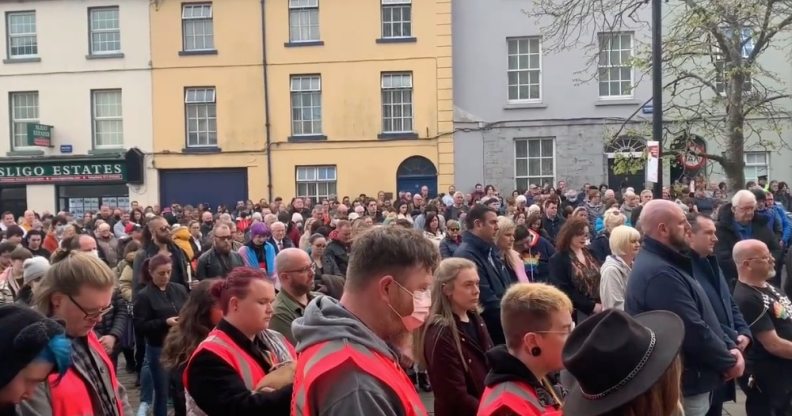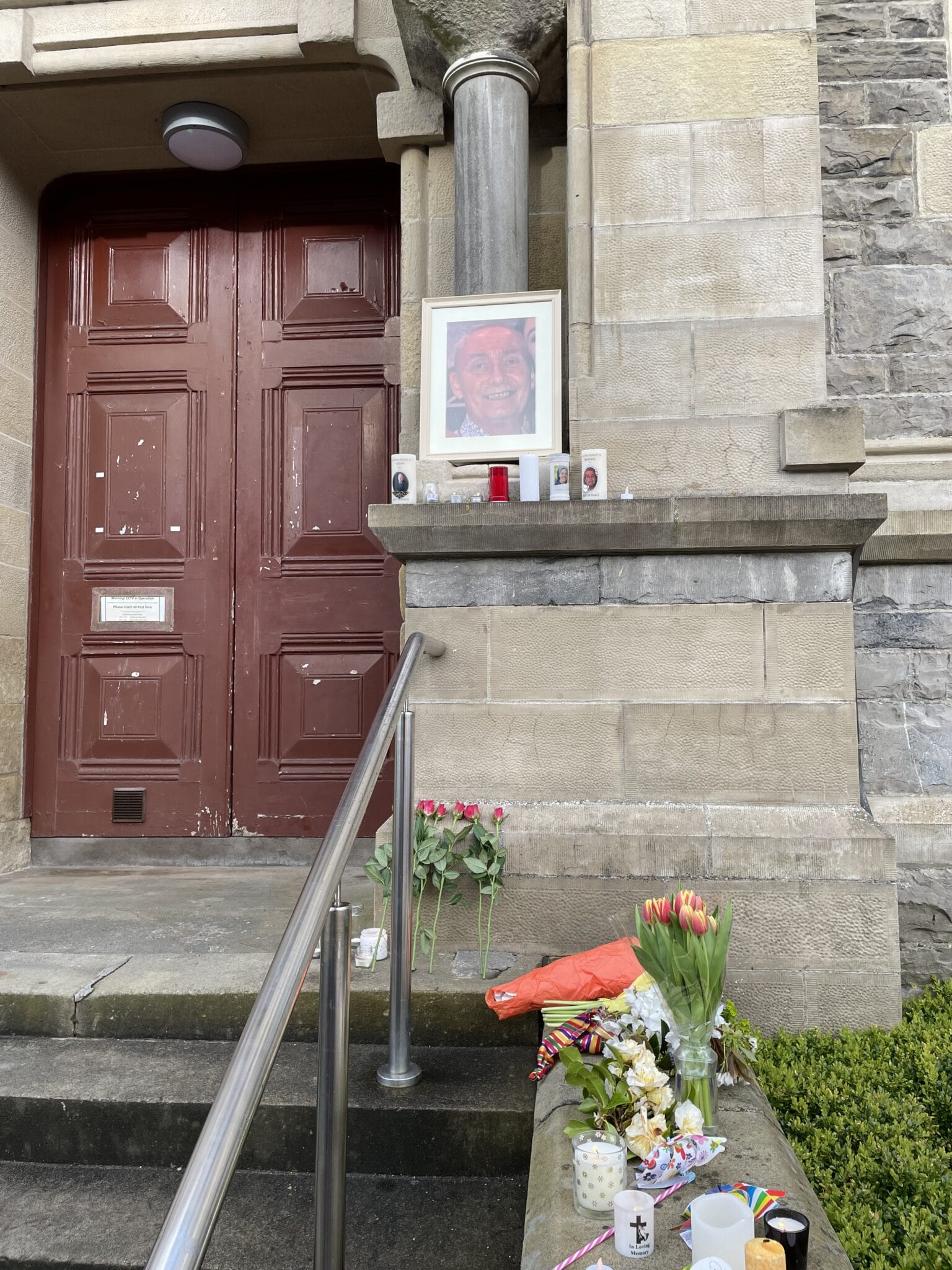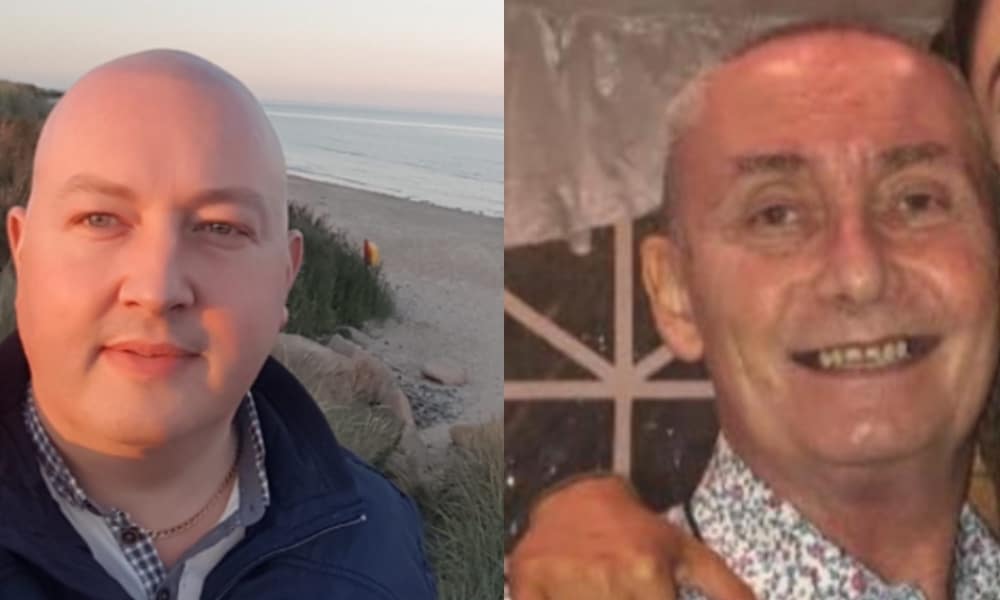Hundreds gather in Sligo to honour murdered gay men: ‘This is not the country we want to live in’

Crowds gathered in Sligo, Ireland, to pay tribute to Aidan Moffitt and Michael Snee, two men who were killed in the town. (Facebook)
Crowds gathered in Sligo, Ireland, to pay tribute to Aidan Moffitt and Michael Snee, two men who were killed in the town. (Facebook)
There were emotional scenes in Sligo, Ireland, as hundreds of people gathered to pay tribute to two gay men who were killed in their own homes.
Ireland’s LGBT+ community was plunged into a state of shock when news broke that Aidan Moffitt and Michael Snee had been killed in the northwestern town. It is thought that both men were killed by a man they had met on a gay dating app.
A 22-year-old has been charged and has been remanded in custody in connection with the killings.
Hundreds gathered outside Sligo’s city hall on Friday evening (15 April) for a vigil in memory of Moffitt and Snee.
Catriona Bonner, chair of Sligo Pride, told the gathered crowd that she was “horrified” when she learned of their deaths.
“If there is anything to come from this tragedy, it’s the highlighted awareness of much-needed hate crime legislation and the much needed allyship of our community outside of Pride events,” Bonner said.
“If you see any suspected hate-based crime according to a person from any marginalised community, please use your privilege to step in and de-escalate the situation in any way possible.”
Cathy Blake, an activist with Outwest, offered her “heartfelt condolences” to the families and loved ones of Moffitt and Snee.

A picture of Michael Snee can be seen hanging outside the City Hall in Sligo. (PinkNews)
“We are quite close to you, we’re based in Mayo, and we feel your pain,” she said.
“This has been a horrific event in the west of Ireland. Even though investigations are ongoing and nothing has been confirmed, there is a suspicion that this was a homophobic attack. This has left the community feeling saddened, horrified and also very frightened.
“The LGBTQIA community often face crimes of violence against themselves, whether it be verbal or physical. They often experience victimisation and discrimination.
No one in a marginalised group should feel unease or that they are unsafe wherever they live.
“This is not the country we want to live in. We want a country where everybody, regardless of who you are, is treated equally. It shouldn’t take something like this horrific attack to bring this to everyone’s attention.”
She continued: “I would ask you all to please, please, have consideration and respect and love for the people that live in your community and to support them and to be there for them when they need you.”
Gardaí and media criticised for ‘sensationalising’ brutal killings
Isaac Griffin from United Against Racism described the killings as “extremely shocking” for the entire LGBT+ community, but also for the people of Sligo.
“No one should be made out to be a target within their community and because of these tragic losses and attacks no one in a marginalised group should feel unease or that they are unsafe wherever they live,” Griffin said.
They also criticised An Garda Síochána, Ireland’s police force, for releasing personal details about the victims and the manner in which they died, saying they had “sensationalised” the killings.
“Especially over the past 48 hours, we’ve seen the media shift their focus from all of the victims and onto the perpetrators, and with this there has been a rise in racist rhetoric, both on and offline, as well as in-person attacks.

Aidan Moffitt (L) and Michael Snee (R). (Facebook)
“We need to remain united that all of Sligo, as well as across the nation, denounces any form of racist, hate-motivated crime enacted on anyone as justification for what has occurred here over the last week.”
Arthur Gibbons, mayor of Sligo, told the crowd that the killings were “not reflective” of the town.
“Sligo is a good place to live and it welcomes everybody,” he said.
“Every one of us is very, very proud of Sligo and there’s one thing that can make Sligo better, that everyone lives together and lives in harmony.”
Ireland’s LGBT+ community mourn the loss of ‘fragile’ sense of safety
Niall Jordan, an activist with Leitrim Pride, was just one of the LGBT+ people who visited Sligo to attend the vigil on Friday evening. He told PinkNews that Moffitt and Snee’s deaths had “burst the bubble” of safety for queer people in Ireland.
“I’m trying to get used to this idea that this is still something that we have to deal with everyday. There’s a sense that, over the last few years, we’ve been able to develop this bubble to protect ourselves, but it’s a very fragile bubble. This is one of those moments where it’s burst again, and it’s affected everyone in big, big ways, and it’s opened a lot of very old scars, not just for myself personally, but for a lot of people in the community.
“My initial reaction was one of shock and disbelief. I just wasn’t sure if all the information was going to be true and accurate – I didn’t want to believe it, and then I moved very quickly into upset and anger in turn. I don’t think I’m really out of those phases yet. Even last night, before I came here, I was still breaking down crying.”
He continued: “It’s wonderful to see so many people coming out and sharing in that sense of community, because it’s in the toughest times that we need that.”
It’s been an incredibly difficult week to think that this can happen in your home county, somewhere as small as Sligo.
Ódhran Killorain, who’s from just outside Sligo, said he was “totally shocked” by the killings.
“I stayed in Sligo town before all the atrocities started to happen and I’ve been absolutely shook since. It’s been an incredibly difficult week to think that this can happen in your home county, somewhere as small as Sligo. I’m just heartbroken for the two men and their families and the community in general.”
Killorain called on gay dating apps like Grindr to take action to make their platforms safer for queer people.
“Apps like Grindr, every gay person, no matter what age, they’ve all been on that app. They need to set up face recognition or something like that to deter this sort of violence. Why is that not happening? Why isn’t it in place? It’s something that needs to be asked for.
“I would feel fearful now at the moment. I’d be very, very conscious about meeting anyone, to the point where you’d nearly ask for a specific picture or a pose just to know you’re meeting who you’re actually seeing.”
Ódhran attended the vigil with Iain McGowan, his best friend. Iain is straight but was eager to attend the vigil to show his support for the LGBT+ community.
“It’s just such a shocking thing to happen in Sligo,” McGowan said. “For such a small town, it’s very community driven. For someone to come into it and attack anybody, it doesn’t matter who it is, it just hits us all.
“Ódhran is my best friend and I instantly thought of him when I heard the news. It just seems very, very real. You hear of things like this happening in other places and it doesn’t feel as real because you’re just reading about it, but when it happens in a town like Sligo, it cuts very deep.”
Vigils took place all across Ireland on Friday evening, with politicians, LGBT+ people and community leaders paying their respects to Moffitt and Snee.
Moffitt was an auctioneer and Fine Gael activist. He was originally from Roscommon but had been living in Sligo before his death. He was found dead at his Sligo home on Monday evening (11 April).
Snee, a healthcare worker and gardening enthusiast, lived alone with his dog in the town. His body was found by relatives on Tuesday (12 April).
Yousef Palani, a 22-year-old man from Sligo, was charged with murder on Thursday (14 April) and was remanded in custody.

